This Chicken Florentine recipe is sponsored by Danish Creamery Butter. All opinions are my own.
Chicken Florentine bathed in a Parmesan garlic cream sauce on your table in just over 30 minutes!
This Chicken Florentine is a comforting, quick and easy, one-pot wonder the whole family will be raving about! It’s deceptively simple to make with pantry friendly ingredients in less than 40 minutes! Best of all, there is plenty of lightened up, flavorful sauce to swaddle the juicy, golden pan-seared chicken and versatile vegetables.
One skillet chicken dinners are a weeknight lifesaver – you can never have enough. Some of our back-pocket favorites include Creamy Tuscan Chicken, Lemon Pepper Chicken and Asparagus, Chicken Piccata, Coconut Chicken, Green Chili Chicken and Italian Chicken and Orzo.
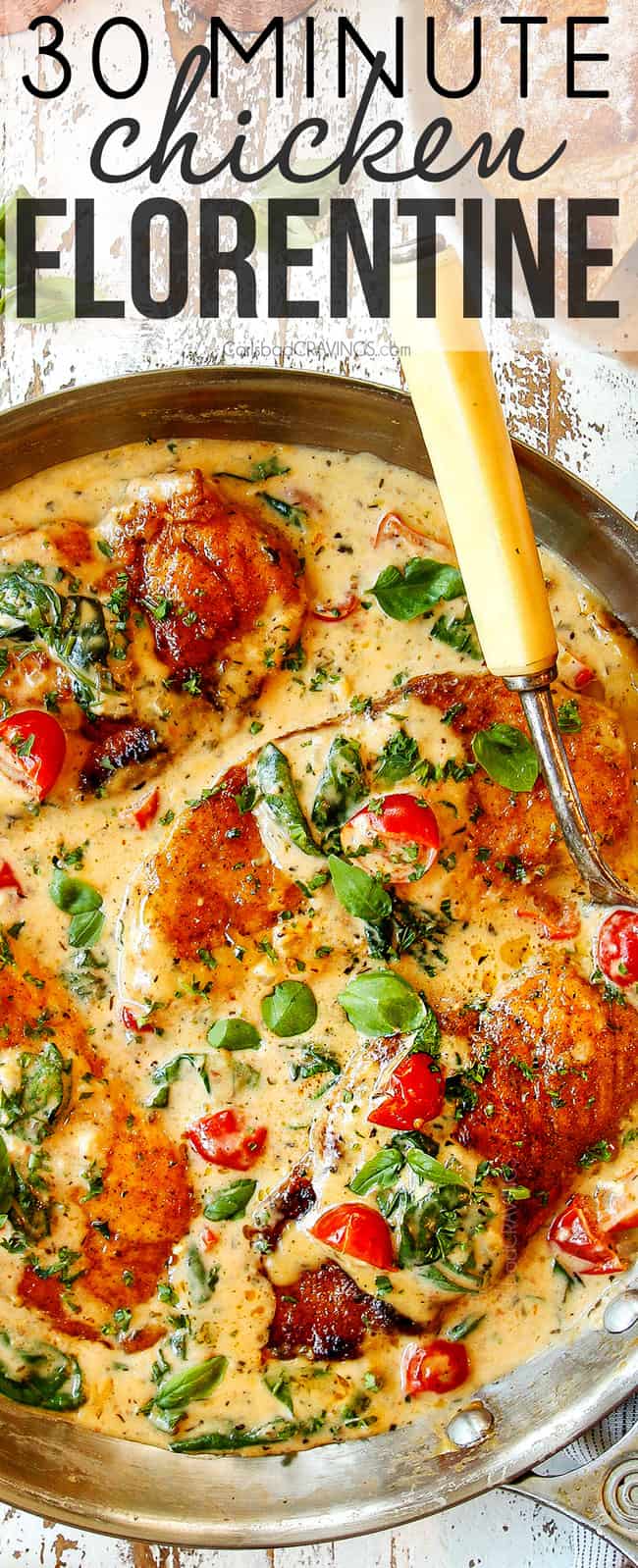
PIN THIS RECIPE TO SAVE FOR LATER
CHICKEN FLORENTINE RECIPE
This easy Chicken Florentine recipe fits my mantra for “no boring chicken!” If your family is like mine, you consume chicken multiple times a week but that doesn’t mean chicken can’t taste new and exciting every time – you just need the right recipe!
This mouthwatering Chicken Florentine hits all the right notes – creamy, comforting, pleasurable, flavorful. The decadent sauce swaddles the tender golden chicken and transforms every bite into satisfying bliss. Best of all, you only need a few simple ingredients and one skillet which also makes cleanup a breeze.
Why you’ll love this Florentine Recipe
- FAMILY FAVORITE. Golden, juicy chicken swimming in a creamy sauce served over pasta or potatoes is a winner with the entire family AKA everyone will be singing your praises at the dinner table instead of negotiating how many more bites they have to take.
- IMPRESSIVE YET INEXPENSIVE. Even though this Chicken Florentine recipe is simple and easy to throw together, it’s out of this world flavorful and elegant enough for dinner guests or special occasions. Plus, it allows you to feed the entire family or dinner guests in the comfort of your own home at a fraction of the price of dining out.
- ONE PAN. You’ll love just having one pan to clean and bonus, cooking everything in one pan builds incredible layers of complex flavor from the chicken seared in Danish Creamery Butter to the aromatic onions and garlic to the bursting tomatoes.
- SIMPLE INGREDIENTS. If you need a dinner that’s unabashedly flavorful but made with minimal pantry friendly ingredients, Chicken Florentine is the answer! You will be blown away at how the humble chicken breast can transform into something truly mesmerizing with just a few simple ingredients. Chicken Florentine is essentially chicken breasts, flour, seasonings, Parmesan, spinach, Danish Creamery Butter, oil, garlic, shallots, chicken broth and cream. These simple ingredients combine to create a dish exponentially more delicious than the sum of its parts.
- QUICK AND EASY. Anyone, even entry level cooks, can make this easy Chicken Florentine recipe. Simply sear the chicken, sauté the veggies and simmer the sauce and dinner can be served in just over 30 minutes – now that’s the epitome of winner, winner chicken dinner! I’ve also included a how to make video, step by step photos and detailed tips and tricks so your Chicken Florentine will emerge perfect every time.
- VERSATILE. This Chicken Florentine recipe is incredibly flexible. While spinach is the signature vegetable, you can also add anything you like from zucchini to mushrooms to asparagus. You can serve the chicken recipe plain or with buttery noodles, mashed potatoes or rice or low carb cauliflower rice or zoodles.
What is Chicken Florentine?
Chicken Florentine refers to golden, pan-fried chicken cutlets served in a creamy Parmesan sauce featuring spinach and Italian seasonings. It is named for its Florentine style of cooking.
“Florentine style” refers to a dish prepared à la Florentine, meaning in the style of Florence, Italy. In the simplest terms, this means the dish contains spinach and a Mornay sauce (béchamel sauce with grated cheese). In culinary terms, this means a main ingredient such as chicken, fish or eggs served on a bed of sautéed buttery spinach topped with Mornay sauce and Parmesan. For example, eggs Florentine, is a variation on eggs Benedict in which a poached egg is served over a bed of spinach on a grilled English muffin with Mornay sauce instead hollandaise sauce.
Today, Chicken Florentine can be served on a bed of spinach with Mornay sauce poured over top, but more often, the pan-fried chicken cutlets are served directly in the sauce. I highly prefer this method because the chicken emerges more tender and flavorful.
WHAT IS FLORENTINE SAUCE MADE OF?
Florentine sauce is very simple to make. It is typically made with heavy cream, white wine, butter, garlic, Parmesan and fresh spinach. Sadly, many Chicken Florentine recipes skimp on the sauce – nooooo! But not this Chicken Florentine recipe!
I’ve kept a traditional flavor profile but omitted the wine and bolstered the sauce with chicken broth and cornstarch so there’s plenty of sauce to go around. The cornstarch also eliminates the trap of weak and watery sauce. The resulting Florentine sauce is intoxicatingly creamy (even creamier than sauces made with all heavy cream!), delightfully flavorful and plain scrumptious! You will need:
- Butter: we will use butter in the sauce and to sear the chicken. Just like quality olive oil is important, so is quality butter! My favorite brand of butter is Danish Creamery. Their butter is made with high quality organic cream from pasture-raised cows since 1895. Their European Style Butter boasts an 85% butterfat (much higher than most other European Style butters which come in at 82-83%) making it a dream in sauces, baking applications, or even just to spread on toast.
- Olive oil: use extra virgin olive oil for superior flavor. A mixture of butter and olive oil when cooking adds extra flavor and the olive oil prevents the butter from burning.
- Heavy cream: is called “heavy whipping cream” at your grocery store.
- Chicken broth: is more flavorful than just milk or cream. Make sure you use low sodium broth so we can control the salt.
- Cornstarch: helps thicken the sauce so its lusciously creamy instead of watery. It allows you to use chicken broth instead of all heavy cream.
- Parmesan cheese: infuses the sauce with its fantastic salty, nuttiness. For best results, use ONLY freshly grated Parmesan cheese. It is much more flavorful and melts into silky oblivion unlike powdered or pre-shredded cheese.
- Shallot: one shallot will do the trick. One shallot is considered the entire bulb, regardless of how many cloves the bulb contains.
- Garlic: I use 4 cloves garlic and it is divine but feel free to use less if you prefer. You may also use 1 teaspoon garlic powder – but the real stuff is so much better!
- Red chili pepper flakes: enlivens the sauce with a little kick. You can also add red pepper to individual servings.
- Seasonings: this Chicken Florentine is seasoned to perfection with parsley, oregano, thyme, salt, and pepper. Use more or less to taste.
- Spinach: you can use baby spinach or mature spinach but you’ll have to tear the mature spinach into smaller pieces. Tips on how to select spinach to follow.
- Tomatoes: are optional but their sweet pops of flavor add so much! Please use ripe cherry tomatoes because they are inherently sweeter than grape tomatoes. If you can’t find cherry, you may use grape.
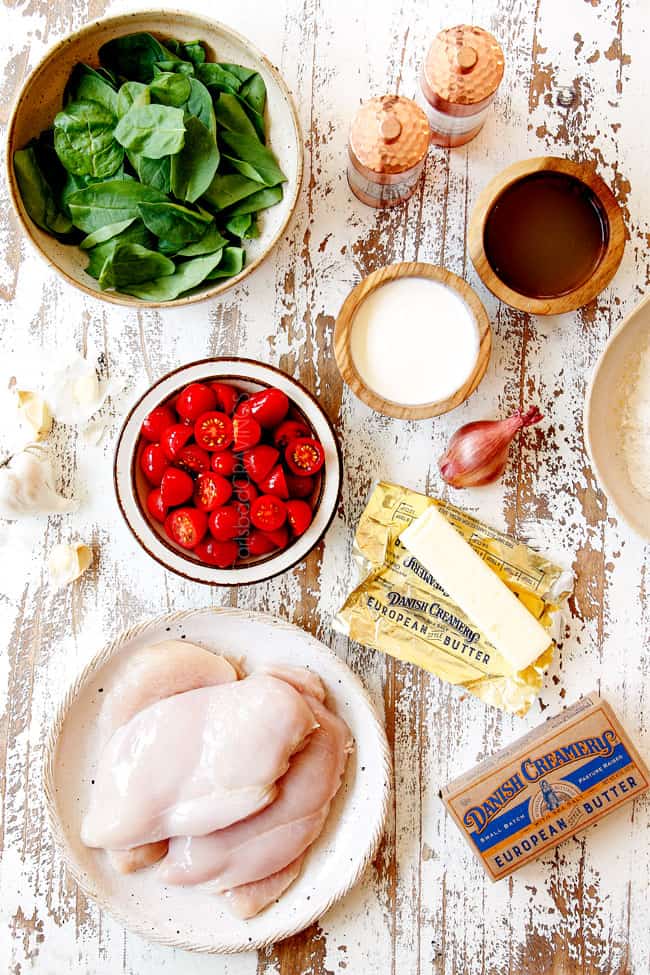
Why use Danish Creamery Butter?
My husband and I both LOVE Danish Creamery Butter! In fact, when I was writing this post, my husband starting gushing about how much he loves their butter. Butter is all about flavor and luxurious creaminess and no one does that better than Danish Creamery – you can literally taste the difference! Danish Creamery is celebrating its 125th birthday this year with its commitment to sustainability, open California pastures, and pasture raised cows – unlike the cows you see smashed together in corrals.
Danish Creamery’s commitment to velvety, rich butter lies in the health of its cows and land. The cows are humanely raised in wide open spaces and happy, healthy cows produce tasty, nutritious milk – the key ingredient to perfect Danish Creamery butters. Add their butter to this Chicken Florentine recipe and all your other recipes and instantly elevate your cooking!
HOW TO PURCHASE FRESH SPINACH:
WHAT CHICKEN SHOULD I USE?
Boneless skinless chicken breasts cut in half to create chicken cutlets are traditional for Chicken Florentine. The thin cutlets cook more evenly, are more tender and soak up more flavor than whole chicken breasts. You can make your own chicken cutlets by slicing two large chicken breasts through the equator or you can purchase packaged pre-sliced cutlets.
Once you have cutlets, pound them to an even thickens. This quick step: 1) tenderizes the chicken as it breaks up the tissues and 2) the uniform thickness allows the chicken to cook evenly all over – without the thinner bottom becoming overcooked while we wait for the thicker top to cook through.
HOW TO MAKE CHICKEN CUTLETS
- Time permitting, freeze your chicken breasts for 15 minutes before slicing. This isn’t essential, but it definitely helps create clean cuts because the chicken doesn’t wiggle with every movement of your knife.
- Next, lay the chicken flat on a cutting board and hold it in place with the palm of your hand.
- Now get out your sharpest knife or sharpen your knife. A sharp knife helps cleanly cut the chicken instead of tearing/shredding the chicken. Carefully slice through the center horizontally (parallel to the cutting board) to create two cutlets.
- Next, pound the chicken to an even thickness by placing the cutlets next to each other and topping with plastic wrap or I like to place my chicken in a large freezer bags because it seals in all the mess/germs – but you can use whatever you have on hand.
- Gently pound the chicken to an even thickens using the smooth side of a mallet, rolling pin, or side of a can. Take care not to over-pound, we are pounding to make the chicken even, not super thin like in Chicken Parm. You don’t need to be too aggressive.
Do I have to use chicken fillets?
Unless your chicken breasts are very small, you will want to use chicken fillets. Traditional chicken breasts take much longer to cook so the crust will burn before the inside of the chicken is cooked. Also, you don’t get the same tasty crust to chicken ratio with thick chicken breasts.
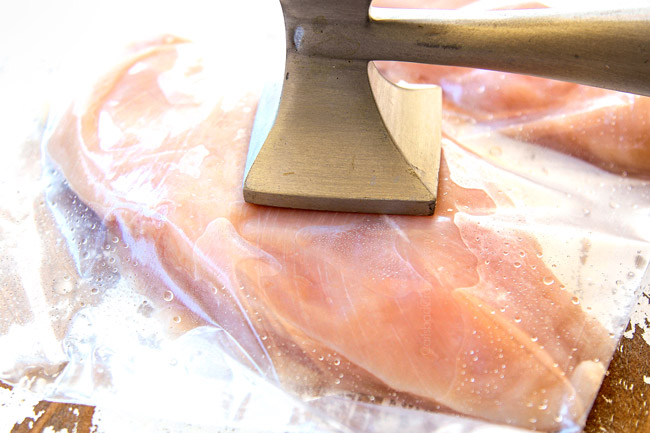
Chicken Florentine Substitutions and Additions
- Heavy cream substitute. You can swap the heavy cream for evaporated milk or milk mixed with 2 teaspoons cornstarch. Just remember that fat equals flavor so the cream sauce won’t taste quite as decadent.
You can add any vegetables to the sauce by sautéing for a couple minutes with the shallots. Some yummy additions would be:
- zucchini
- broccoli
- cauliflower
- bell peppers
- carrots
- peas
- mushrooms: Some Chicken Florentine recipes have mushrooms, some do not. To add mushrooms, sauté them for 3 minutes before adding the shallots then continue to cook the recipe as outlined.
Can I use chicken thighs?
Florentine Chicken is traditionally made with boneless, skinless chicken breasts and I prefer the taste of chicken breasts in this recipe, but you are certainly welcome to use chicken thighs if you prefer.
Can I substitute the heavy cream?
If you’re trying to save some calories, you can substitute the heavy cream with 1 cup milk whisked with 2 teaspoons cornstarch, just take care not to let the sauce boil, just gently simmer. You may also substitute evaporated milk whisked with 1 teaspoon cornstarch.
What’s a good substitute for white wine?
This Chicken Florentine recipe doesn’t use any white wine, but uses chicken broth instead. If you wish to add wine, add it after you’ve cooked the chicken to deglaze the pan.
Can I use frozen spinach?
I prefer to use fresh spinach as the flavor and texture are more desirable but you may use frozen spinach just take care to thaw it completely and squeeze out excess moisture so it doesn’t water down your sauce.
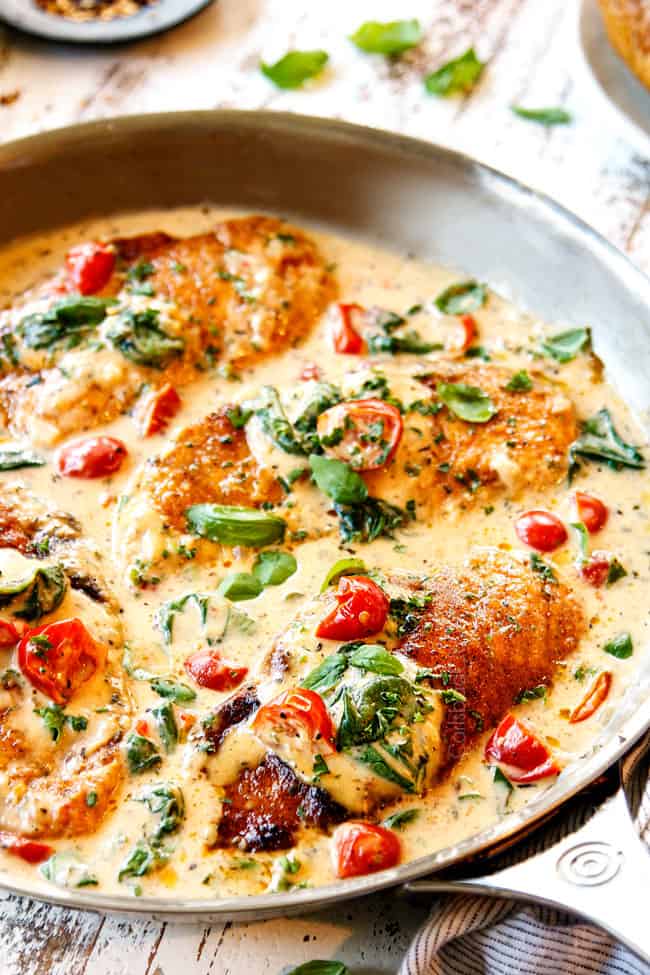
HOW TO MAKE CHICKEN FLORENTINE
This Chicken Florentine recipe is easy to make by following a few simple steps. The meal comes together so quickly that I recommend starting your potatoes, pasta or rice first so it can be ready by the time your dish is complete. Here is a more detailed look at how to make Chicken Florentine:
- DREDGE THE CHICKEN
- Chicken Florentine is often dredged in plain flour or flour with just salt and pepper but that is a huge missed opportunity for flavor. I love dredging the chicken in a mixture of garlic powder, onion powder, salt and paprika. It elevates the chicken to stand-alone delicious and then absolutely hypnotic when served in the luscious sauce.
- Before dredging the chicken, make sure to pat it dry so the flour coating sticks.
- After dredging, transfer the chicken to a dry surface. You don’t want to return the chicken to your cutting board because the moisture left behind from the chicken will make the coating wet and rub off.
Why dredge the chicken in flour?
Dredging the chicken creates a golden crust that insulates the temperamental chicken breast and keeps it juicy and tender, it also seasons the chicken and best of all absorbs butter from cooking – YUM!
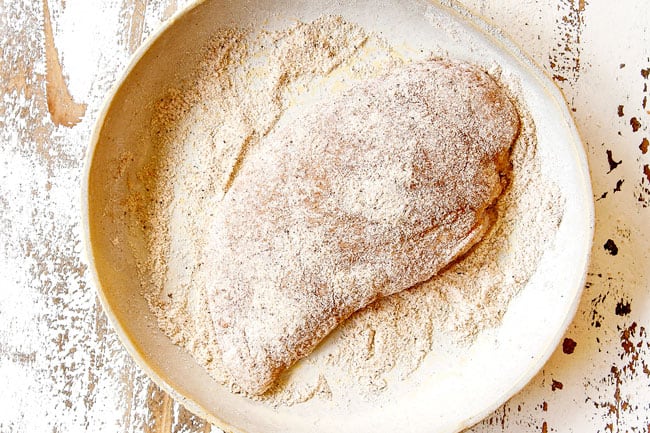
- COOK THE CHICKEN
- Melt the Danish Creamery Butter in olive oil in a large (12-inch) skillet with deep sides. I use a large stainless-steel saucepan.
- Heat the butter/oil so its shimmering. Don’t add the chicken before the butter/oil is hot or it won’t crisp up.
- Once hot, add chicken and cook for 4-5 minutes per side, depending on thickens, or until cooked through. Browning the chicken that’s coated in spices blooms the spices and unlocks the flavor.
- Transfer to a plate, don’t wipe out the skillet – those golden bits left behind are flavor gold!
Why use butter and olive oil?
To elevate the Chicken Florentine, it gets pan fried in a mixture of both Danish Creamery Butter and olive oil just like I do in my Chicken Parmesan recipe. If you’ve never added butter to your pan frying, you will never go back! The butter adds flavor and the oil prevents the butter from burning.
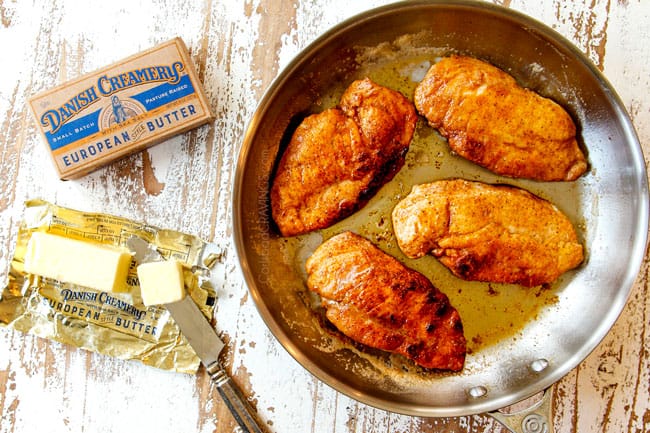
- MAKE SAUCE
- Reduce heat to medium and add one tablespoon butter. One melted, add tomatoes, shallots, garlic and red pepper flakes and sauté until shallots are softened, about 2 minutes.
- Reduce heat to low and stir in heavy cream. Mix chicken broth with cornstarch and add to the pan followed by dried parsley, dried basil, dried oregano, and dried thyme. Of course, you are welcome to use fresh herbs if you prefer. The ratio is 3 parts fresh to one part dried.
- Bring the sauce to a simmer while scraping up any brown bits on the bottom of the pan; simmer until thickened, about 5 minutes.
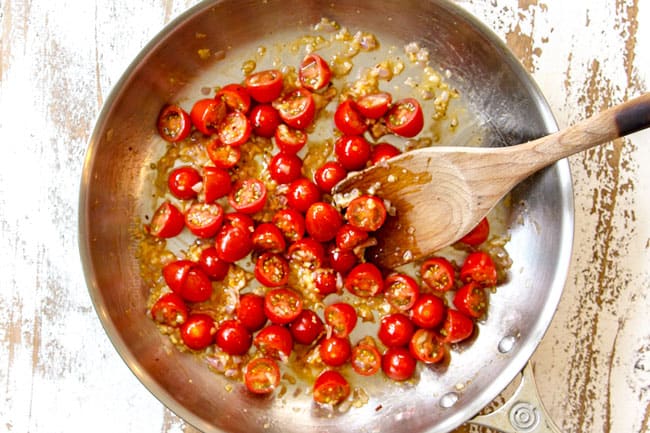
- ADD PARMESAN, SPINACH & CHICKEN
- Once thickened, reduce heat to medium-low and stir in Parmesan cheese. Cook, while stirring until melted, about 2 minutes.
- Stir spinach into the sauce and simmer 1-2 minutes until wilted.
- Add chicken and warm through to soak up the sauce. Garnish with fresh parsley if desired.
- SERVE!
- Serve Chicken Florentine over pasta, spaghetti squash, zucchini noodles, mashed potatoes, rice, cauliflower rice or cauliflower mash.
How to prepare Florentine Chicken in advance
While this Chicken Florentine doesn’t require much prep, you can still prep everything in advance so your dinner can come together in minutes.
- Prep chicken. Create chicken cutlets by slicing chicken breasts in half and pounding to an even thickens. Store in an airtight container in the refrigerator.
- Dredge chicken. You can go one step further and dredge the chicken in flour and spices. Transfer the chicken to a parchment lined plate in a single layer and tightly cover with plastic wrap. Store in the refrigerator.
- Chop aromatics. Dice the shallots and mince the garlic and store in separate plastic bags in the refrigerator.
- Grate cheese. Grate the fresh Parmesan and store in an airtight container in the refrigerator.
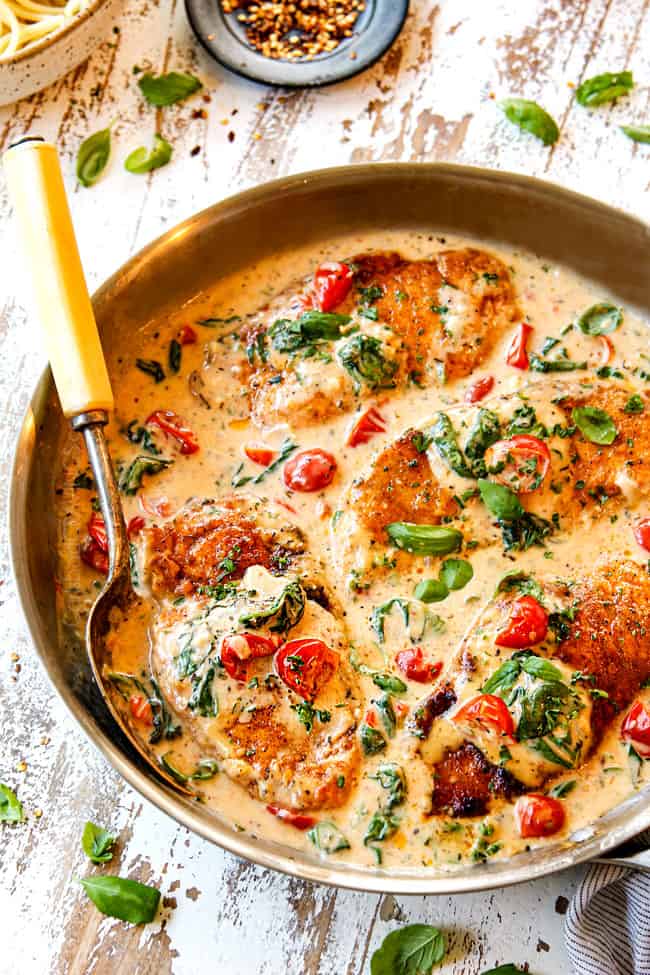
TIPS FOR CHICKEN FLORENTINE
Chicken Florentine recipe is pretty straightforward but here is a summary of helpful tips:
- Don’t cook spinach in aluminum or cast-iron pans. These metals can chemically react with the spinach and produce undesirable flavor and color changes. Stainless steel is ideal (much stronger metal than aluminum), as it never reacts with food. I love this stainless-steel pan.
- Don’t overcook spinach. Spinach cooks extremely quickly and should not be overcooked to maintain its flavor. For best results, cook spinach on low just until it starts to wilt then remove from heat; it will continue to wilt from residual heat.
- Use fresh FINELY grated Parmesan. Use freshly grated Parmesan for the best flavor and for the best melting ability. Pre-shredded cheeses are coated in anti-clumping chemicals which inhibits their melting ability. When shredding the Parmesan, make sure you are using the smallest, prickly holes of the grater so it becomes powdery.
- Use butter and olive oil. I almost always use a combination of butter and oil whether it’s for making a roux or for pan frying chicken. The butter adds the undeniably scrumptious buttery flavor and the oil prevents the butter from burning. You may use all oil but you cannot use all butter or the butter will burn. I recommend using both for best results.
- Scrape up golden bits. After you cook the chicken there will be golden bits on the bottom of the pan – these are flavor gold! Make sure to scrape up the bits while you sauté the tomatoes.
- Use a hot pan. Add your chicken only once the pan is hot – you should hear the chicken sizzle the second it touches the pan. If you add chicken to a luke-warm pan it will not sear, and as we all know from Gordon Ramsey, color = flavor. Searing the chicken results in the Maillard reaction, also known as the flavor reaction, in which amino acids and reducing sugars produce browning and complex flavor. Note, that hot doesn’t mean high heat, but it means it’s reached full temperature (medium-high in this case).
- Only flip chicken once. Adding the chicken to a hot skillet heated to medium high heat is only half the battle. Resist the urge to move the chicken as it cooks or to flip it more than once. The chicken needs to stay in the same place for a continuous amount of time to brown. When the chicken is browned, it will naturally release from the pan.
- Don’t overcook chicken. Chicken, especially chicken breasts, are juiciest when not overcooked. The best and most efficient way to check for doneness is to insert a meat thermometer into the chicken; chicken breasts are done when they register 165 degrees.
Thickening Florentine Sauce
The sauce will thicken as it simmers; the longer it simmers, the thicker it will become as the heavy cream and broth reduce. If you would like a speedier, thicker sauce, make a slurry by whisking 1 teaspoon cornstarch in 2 tablespoons water then adding to the simmering sauce. Repeat this as step as desired.
HOW DO I THIN THE SAUCE?
I don’t think your sauce will become too thick unless it’s simmered for an exorbitant amount of time. Still, it is easy to thin by whisking in some chicken broth.
TIPS FOR PREPARING SPINACH
- Storage: refrigerate fresh bunches of spinach unwashed in a plastic bag for 3 to 4 days. Don’t wash until you’re ready to use as the moisture will cause it to spoil.
- Store in original packing: many of the bags/plastic containers the spinach is sold in are designed to keep the spinach fresh.
- Wash spinach before using: spinach can be very sandy and should be washed before using. To wash, don’t just rinse, but separate the leaves and submerge in a large bowl of water and gently swish. Next, thoroughly rinse.
- Rinse bagged spinach: even though bagged spinach usually comes pre-washed, it’s a good idea to give the spinach a thorough rinse, although you don’t have to completely submerge the spinach, a good old rinse and spin in a salad spinner will do the trick.
- Dry spinach: the most effective way to dry spinach is in a salad spinner although you can also pat dry with paper towels.
- Trim spinach: you can eat the stems of the spinach, but any tough stems should be removed prior to cooking or eating.
- To tear or not to tear: if you purchase baby spinach, you will likely not have to tear the spinach into smaller pieces, especially if cooking because the spinach shrinks considerably. If you purchase mature spinach, you will likely need to tear large leaves into smaller pieces.
Chicken Florentine Recipe Variations:
This Chicken Florentine recipe can be made more cheesy, lemony, with different veggies, etc. Here are a few ideas to mix it up:
- Alternate protein. The Florentine sauce is so scrumptious you’re going to want to use it with everything! You can sub the chicken breasts for boneless skinless chicken thighs, salmon fillets, pork chops (recommend brining first) or shrimp. You can even use ground Italian sausage or cooked chicken sausage. Note that different proteins (even chicken thighs) will vary in cooking time, so use meat thermometer to check for doneness.
- Just use the sauce! The sauce can be used over eggs, green beans, pasta, potatoes, etc.
- Add lemon. You can add a citrus spin by adding 2 tablespoons lemon juice to the cream sauce.
- Add melted mozzarella. Layer the chicken with fresh mozzarella slices, cover and turn the skillet to low until the cheese melts.
- Mix up the cheeses. In addition to or in place of Parmesan, you can use Gouda, Fontina, Gruyere, etc. to mix up the flavor profile.
- Add vegetables. In addition to the spinach (or instead of, just don’t call it Chicken Florentine 😉), you can add any veggies you like such as mushrooms, zucchini/squash, broccoli, green beans, asparagus, bell peppers, eggplant, Brussels sprouts etc. Just be aware of different vegetable cooking times.
- Add sun-dried tomatoes. Add sun-dried tomatoes in addition to the cherry tomatoes. Purchase the sun-dried tomatoes in a jar packed in oil, not water. They are usually located near the olives or pickles at your grocery store. Use the oil in the jar instead of the olive oil. Rinse the tomatoes, pat dry, chop and sauté with the shallots.
- Artichokes. Are tender, slightly sweet and nutty and divine in creamy sauces. Purchase artichoke hearts in water NOT marinated. The marinated ones often have an acrid taste. Chop and sauté with the shallots.
- Spice it up. Amp up the heat with additional red pepper flakes. I always add at least ¼ teaspoon red pepper flakes but if you want to really taste the kick, add ½ teaspoon. You can also add additional red pepper flakes to individual servings to keep recipe family friendly.
Can I make Chicken Florentine gluten free?
Yes! Simply swap the flour for gluten free flour and you’re all set.
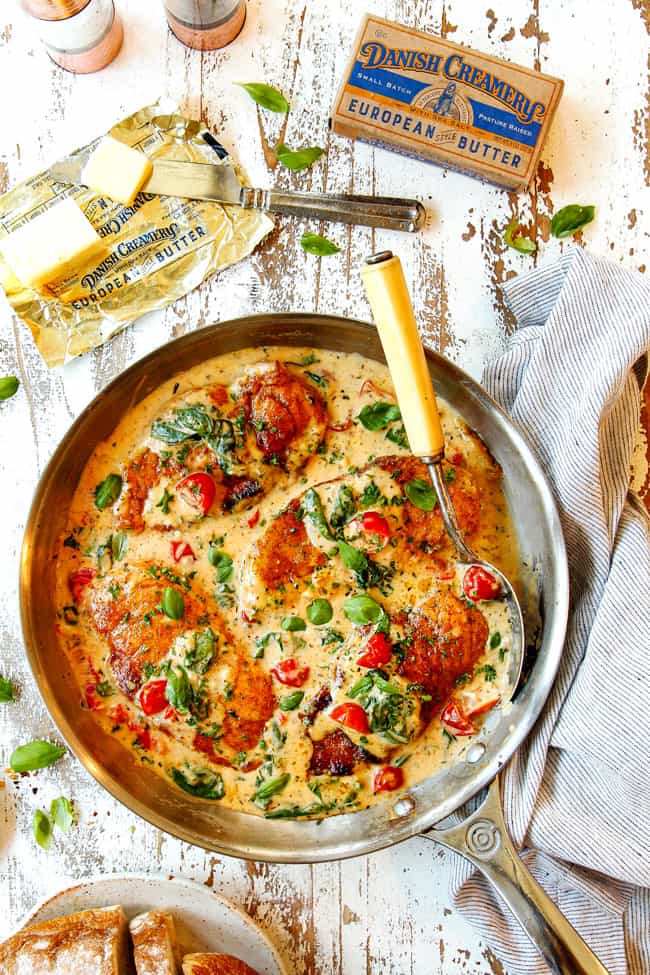
Storing and Reheating Creamy Chicken Florentine
- Storage: Chicken Florentine should be stored in an airtight container in the fridge for three to five days.
Reheating Florentine
- Microwave: chop up chicken so it reheats more evenly then transfer a small portion to a microwave safe dish. Heat for one minute, stir, then continue to heat at 30 second intervals.
- Stove: chop up chicken then transfer to a skillet. Heat over medium heat stirring often.
Can I freeze Chicken Florentine?
I do not recommend freezing because the creamy sauce can break and become a funny texture. If you want to try freezing, use evaporated milk instead of heavy cream and omit the Parmesan.
WHAT CAN I SERVE WITH CHICKEN FLORENTINE
This saucy Chicken Florentine is begging to be served over carbs to soak up the luscious sauce. We love it over:
- A bed of buttery mashed potatoes – my favorite way to serve it!
- Pasta such as spaghetti, cavatappi penne, campanelle, fusilli, etc.
- Stuffed pastas such as ravioli or tortellini – yum!
- Rice – any kind!
- Low carb alternative such cauliflower mashed “potatoes,” cauliflower rice, zucchini noodles or spaghetti squash
Now that the Chicken Florentine is squared away, let’s talk sides. We love adding roasted veggies on the side such as roasted Brussels sprouts, broccoli, or asparagus or a fresh salad like wedge Salad, strawberry salad, or spinach Berry Salad in the spring/summer and apple salad, pear salad or beet salad in the Winter.
Lastly, bread is a must to ensure no sauce is left behind. You can serve Chicken Florentine with a simple side of crusty bread or we’re obsessed with my Garlic Bread, Dinner Rolls, or Garlic Parmesan Butter Breadsticks.
Florentine FAQs
Florence became known for its abundant use of spinach in the 1600s thanks to the queen of France, Catherine de Medici’s. Catherine was born in Florence, Italy and ultimately became the Queen of France after her husband died.
According to legend, Catherine was so fond of spinach that she brought spinach seeds with her to France when she was married and insisted on its cultivation. During her reign, so many dishes were served with her favorite leafy vegetable that dishes containing spinach became known as spinach à la Florentine or in English, Florentine.
Color: look for leaves that are perky medium to dark green in color without any yellowing, wilting or evidence of decay.
Stems: look for thin stems which indicates the spinach was picked at peak freshness which means it will have the best flavor and texture. Large stems indicate overgrown spinach that will be tough and/or bitter.
Feel: give the bag of spinach a gentle squeeze; if the spinach springs back easily, it’s likely fresh.
What to avoid: spinach leaves that are slimy, yellow or have a sour, musty odor.
I almost always use a combination of butter and oil whether it’s for making a roux or for pan frying chicken. The butter adds the undeniably scrumptious, decadent buttery flavor and the oil prevents the butter from burning. You may use all oil but you cannot use all butter or the butter will burn. I recommend using both for best results. If you want to use a different oil, make sure it has a high smoking point and neutral flavor.
Dredging the chicken in flour is highly recommended but not a must. The flour creates a crust that insulates the chicken and also carries flavor. If you skip the flour, still coat the chicken in the same seasonings.
For the juiciest chicken, it should be pounded to an even thickness. Pounding the chicken ensures the chicken cooks evenly otherwise you’ll be waiting for the thick part of the chicken to cook at the peril of the thin part.
Sometimes chicken fillets even out after cutting. The bottom half of the chicken breast is usually more even than the top half. Even if it looks even, give it a little pounding to tenderize the protein fibers.
When a dish is cooked Florentine, it typically features spinach as the key vegetable ingredient. Originating from Italian cuisine and inspired by the culinary traditions of Florence, “Florentine” style often involves incorporating fresh or sautéed spinach into various dishes, such as omelets, pasta, or sauces. It adds nutrients, flavor and vibrant color.
Spinach dishes are called “Florentine” as a nod to its popularity and cultivation in Florence. The term “Florentine” in cooking signifies a preparation style or ingredient combination associated with this region. This green, leafy vegetable became a staple in Florentine cuisine, and its incorporation into various recipes, such as creamy sauces, omelets, and pasta dishes, has since been identified with the distinctive Florentine culinary style. The term has been widely adopted to describe any dish featuring spinach.
The term is associated with the culinary traditions of Florence, Italy, and dishes labeled as “Florentine” often feature spinach as a prominent component.
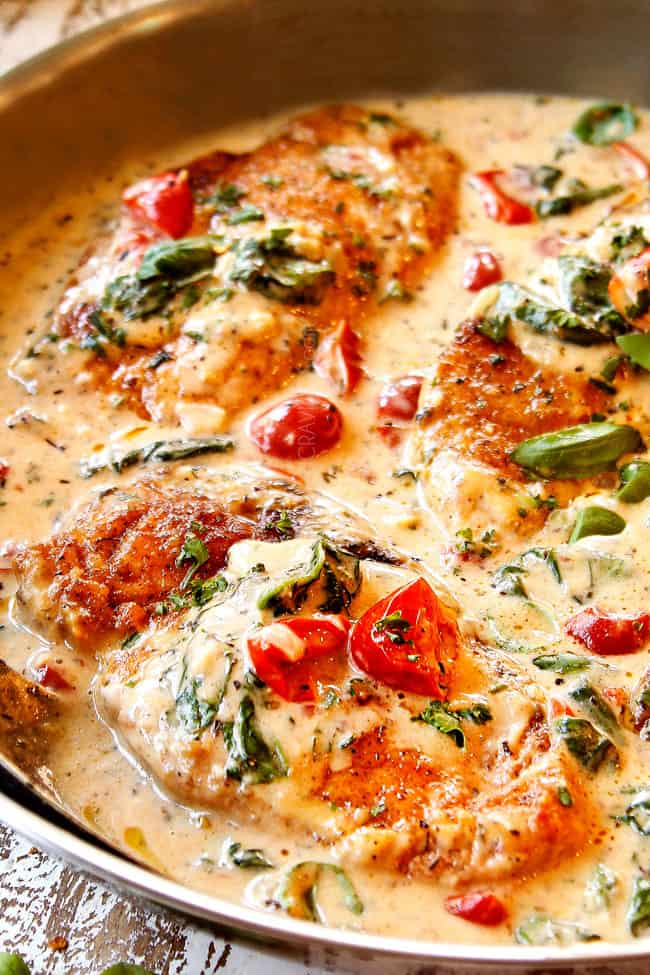
Want to try this Chicken Florentine RECIPE?
Pin it to your Dinner, Chicken or 30-minute-meals Board to SAVE for later!
Find me on Pinterest for more great recipes! I am always pinning :)!
©Carlsbad Cravings by CarlsbadCravings.com
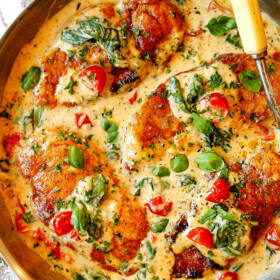
CHICKEN FLORENTINE
Save This Recipe To Your Recipe Box
You can now create an account on our site and save your favorite recipes all in one place!
Ingredients
Chicken
- 2 large chicken breasts (about 24 ounces)
- 3 tablespoons flour
- 1 tsp EACH salt, garlic powder, onion powder
- 1/2 tsp EACH pepper, paprika
- 2 tablespoons Danish Creamery Butter
- 2 tablespoons olive oil
Sauce
- 1 tablespoon Danish Creamery Butter
- 1 pint cherry tomatoes halved
- 1 shallot, minced
- 4 cloves garlic minced
- 1/4 teaspoon red pepper flakes
- 1 1/2 cups low sodium chicken broth
- 1 tablespoon cornstarch
- 1 cup heavy cream or evaporated milk + 1 tsp cornstarch
- 1 teaspoon dried parsley, dried basil or 1 TBS EACH fresh
- 1/2 tsp EACH dried oregano, dried thyme
- 1/4 tsp EACH salt, pepper
- 1/3 cup finely grated fresh Parmesan cheese
- 4 cups baby spinach
Instructions
- Whisk the flour and all chicken seasoning together in a shallow dish. Dredge each breast in the mixture, shake off any excess, then transfer to a dry surface.
- Melt the 2 tablespoons butter in 2 tablespoons olive oil in a large skillet over medium-high heat. Once hot, add chicken and cook for 4-5 (depending on thickness) until golden and cooked through. Transfer chicken to a plate, don't wipe out skillet.
- Reduce heat to medium and add one tablespoon butter. One melted, add tomatoes, shallots, garlic and red pepper flakes and sauté until shallots are softened, about 2 minutes. Reduce heat to low and stir in heavy cream. Mix chicken broth with cornstarch and add to the skillet followed by all of the sauce seasonings.
- Bring sauce to a simmer while scraping up any brown bits on the bottom of the pan; simmer until thickened, about 5 minutes.
- Once thickened, reduce heat to medium-low and stir in Parmesan cheese. Cook, while stirring until melted, about 2 minutes. Stir spinach into the sauce and cook 1-2 minutes, just until wilted.
- Add chicken and warm through to soak up the sauce. Garnish with fresh parsley if desired. Serve over mashed potatoes, pasta, spaghetti squash, zucchini noodles, rice, cauliflower rice or cauliflower mash.
Video
Notes
TIPS and tricks
- Chicken thighs. You are welcome to use boneless skinless chicken thighs if you prefer. They will likely require less cooking time, so it’s best to check their temperature with an instant read thermometer.
- Frozen spinach. I prefer to use fresh spinach as the flavor and texture are more desirable but you may use frozen spinach just take care to thaw it completely and squeeze out excess moisture so it doesn’t water down your sauce.
- Don’t cook spinach in aluminum or cast-iron pans. These metals can chemically react with the spinach and produce undesirable flavor and color changes. Stainless steel is ideal (much stronger metal than aluminum), as it never reacts with food. I love this stainless-steel pan.
- Don’t overcook spinach. Spinach cooks extremely quickly and should not be overcooked to maintain its flavor. For best results, cook spinach on low just until it starts to wilt then remove from heat; it will continue to wilt from residual heat.
- Heavy cream substitute. You can swap the heavy cream for evaporated milk whisked with 1 teaspoon cornstarch or milk mixed with 2 teaspoons cornstarch.
- Use fresh Parmesan. Use FINLEY, freshly grated Parmesan (like powder) for the best flavor and for the best melting ability. Pre-shredded cheeses are coated in anti-clumping chemicals which inhibits their melting ability.
- Use a hot pan. Add your chicken only once the pan is hot – you should hear the chicken sizzle the second it touches the pan. If you add chicken to a luke-warm pan it will not sear.
- Don’t overcook chicken. Chicken, especially chicken breasts, are juiciest when not overcooked. The best and most efficient way to check for doneness is to insert a meat thermometer into the chicken; chicken breasts are done when they register 165 degrees.
- Gluten free Chicken Florentine. Swap the flour for gluten free flour and you’re all set.
- Can I freeze Chicken Florentine? I do not recommend freezing because the creamy sauce can break and become a funny texture. If you want to try freezing, use evaporated milk instead of heavy cream and omit the Parmesan.
PREP AHEAD
This Chicken Florentine doesn’t require much prep, you can still prep everything in advance so your dinner can come together in minutes.- Prep chicken. Create chicken cutlets by slicing chicken breasts in half and pounding to an even thickens. Store in an airtight container in the refrigerator.
- Dredge chicken. You can go one step further and dredge the chicken in flour and spices. Transfer the chicken to a parchment lined plate in a single layer and tightly cover with plastic wrap. Store in the refrigerator.
- Chop aromatics. Dice the shallots and mince the garlic and store in separate plastic bags in the refrigerator.
- Grate cheese. Grate the fresh Parmesan and store in an airtight container in the refrigerator.
HOW TO STORE AND REHEAT
- Storage: Chicken Florentine should be stored in an airtight container in the fridge for three to five days.
- Microwave: chop up chicken so it reheats more evenly then transfer a small portion to a microwave safe dish. Heat for one minute, stir, then continue to heat at 30 second intervals.
- Stove: chop up chicken then transfer to a skillet. Heat over medium heat stirring often.

Did You Make This Recipe?
Tag @CarlsbadCravings and Use #CarlsbadCravngs
Leave a Review, I Always Love Hearing From You!
Carlsbad Cravings© Original
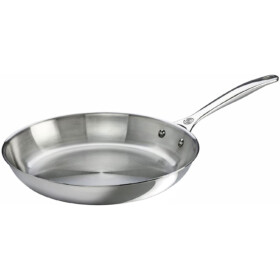
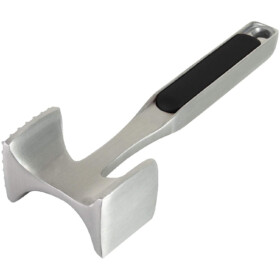


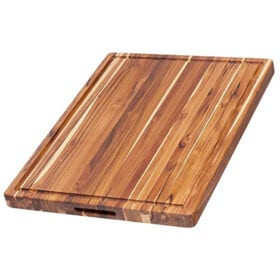

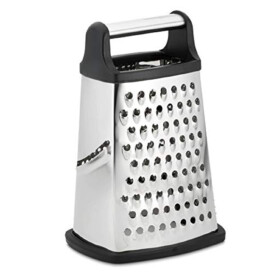

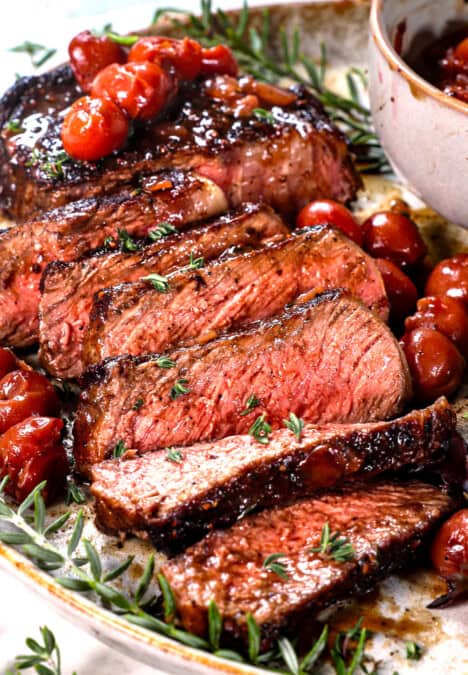
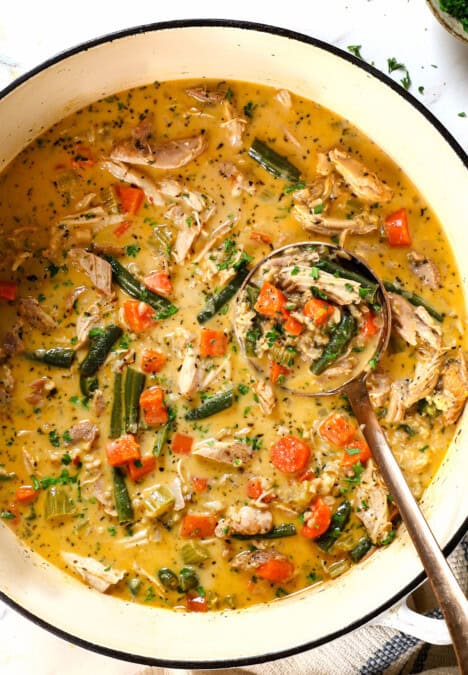
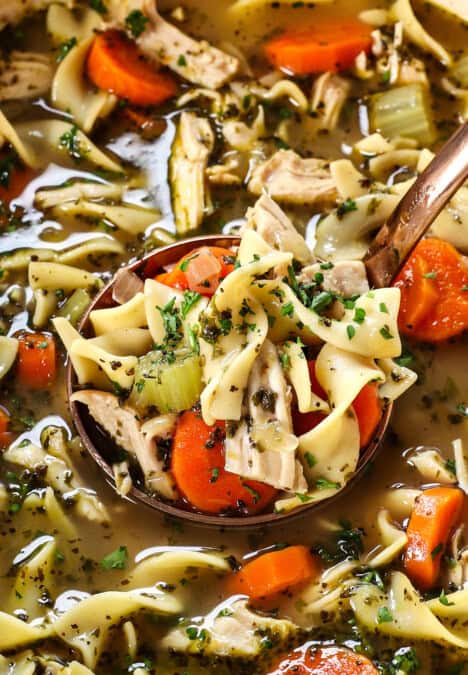


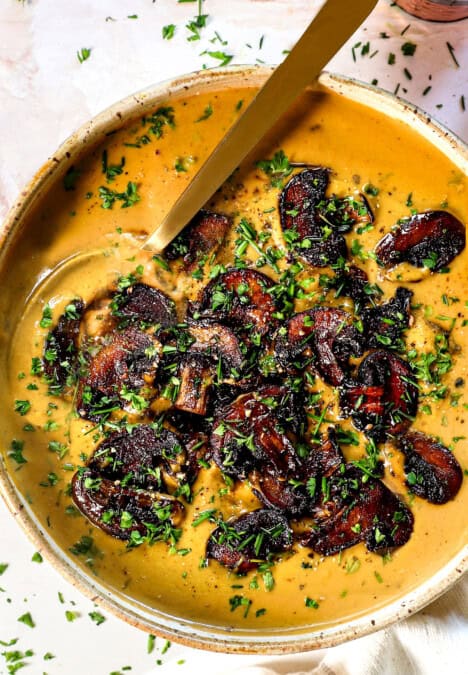


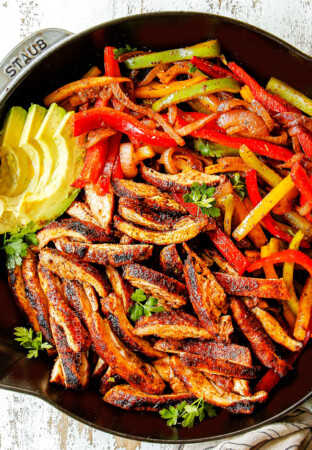
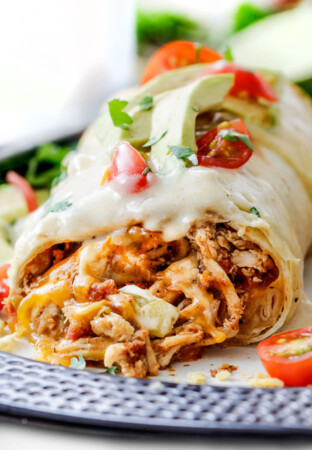
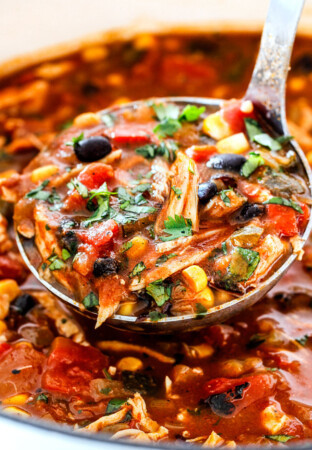
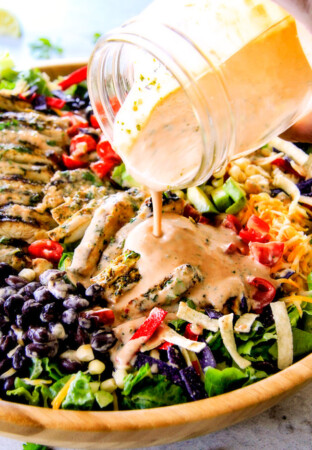
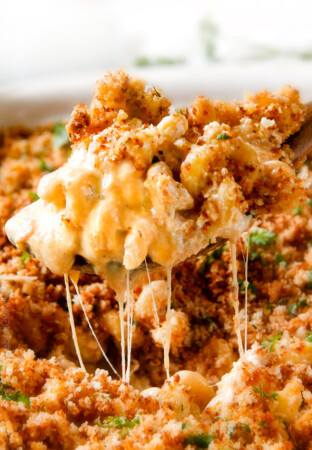



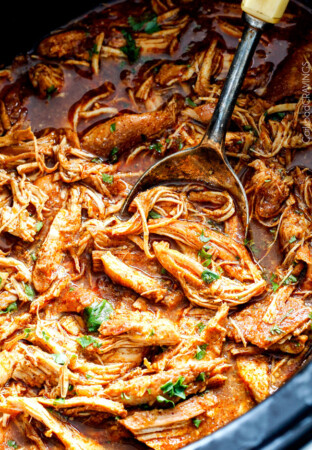
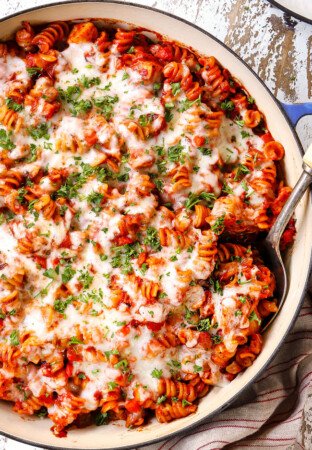

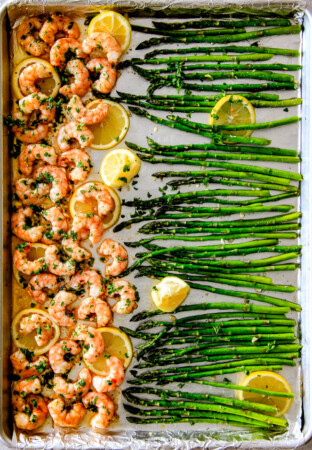

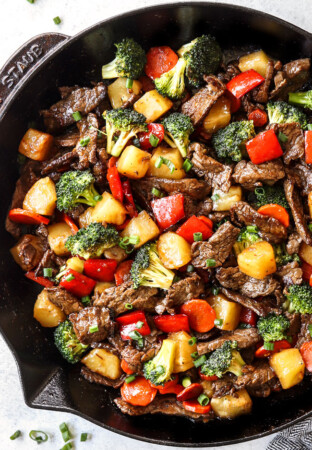
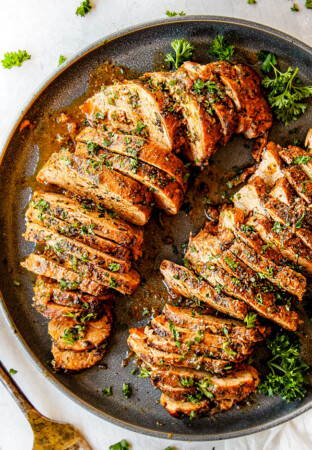
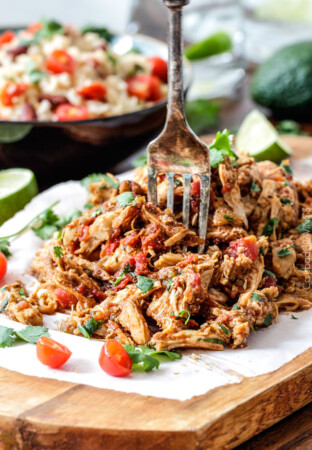
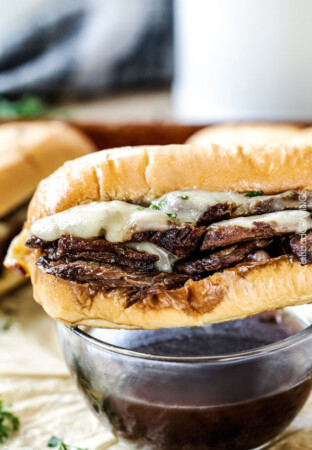
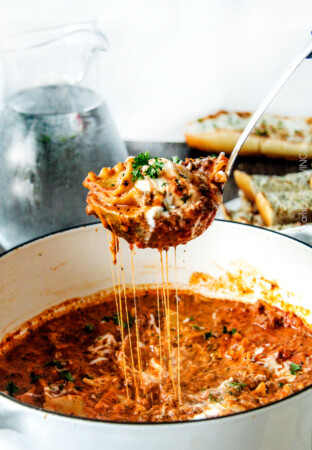
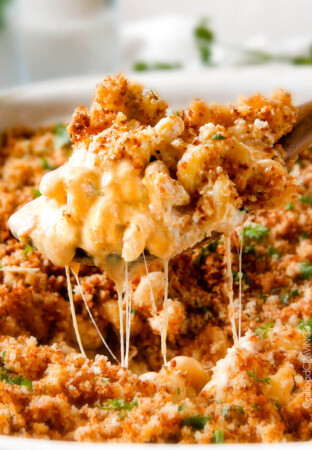
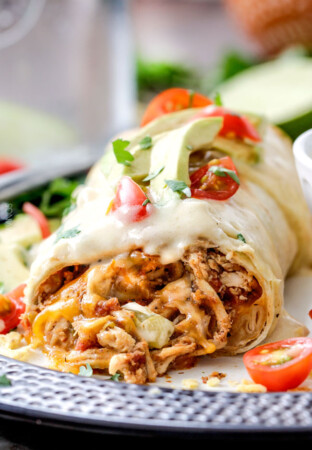
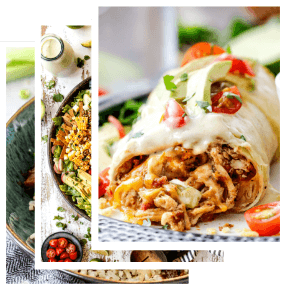
Cathy says
What is the approximate weight of chicken breasts? Size varies greatly and I want to have enough sauce.
Jen says
Hi Cathy, great question! You will want approximately 24 ounces total but there is definitely wiggle room.
JoanD says
This was the third of your recipes we have tried and again it turned out amazingly! Thanks so much! We’ve also tried the Turkish Doners and the Homemade Hamburger Helper. And now I’m on your page looking for more inspiration!
Jen says
Welcome to my site Joan! I am so pleased you loved this Chicken Florentine (thanks for being the first to review btw), as well as the doner kebabs and hamburger helper! I hope you have fun exploring my site and hopefully find many new favorites!
Annette says
Made it a couple days ago over zoodles and decided it deserved a coveted spot on my Winners Board on Pinterest. Just ate the leftovers and excuse me for licking the bowl!
Jen says
Thank you for the taking the time to comment Annette! I’m honored it earned the highest praise of a spot on your Winner’s Board, thank you!
Joddi Murdock says
Thank you for another amazing recipe! I made this for dinner this week and it was delicious!
Jen says
You’re so welcome Joddi, I’m so pleased it was a winner!
Nikki says
This was amazing! My whole family loved it. So much flavor and super easy to throw together.
Jen says
Thanks so much Nikki, I’m so pleased it was a hit with the whole fam!
Jean says
I made this recipe for dinner tonight and it was AMAZINGLY delicious!!! Thanks, Jen!! 🙂
Jen says
YAY! Thanks so much Jean, I’m so pleased it was such a hit!
Leslie says
I just found your site and my family and I LOVED this recipe! My guys could not get enough of it! Flavorful and filling. Thanks l!
Jen says
Welcome to my site Leslie! I’m so pleased your first recipe was such a hit! I hope you enjoy exploring my site and hopefully find many new favorites!
Jennifer Fulk says
I was wondering if this recipe would work well with chicken tenderloins? Should I still pound them out? This looks delicious!
Jen says
Yes, they would work great, no need to pound. Enjoy!
Jennifer Fulk says
This looks amazing! Could I use half and half in place of heavy cream and should I add cornstarch to it? Putting this on my menu plan for the week!
Jen says
Great question! Yes, I would mix 1 cup half and half with 2 teaspoons cornstarch. If the sauce becomes too thick by chance then you can dilute with some broth or extra half and half.
AKMAMA says
Looks good! I’m going to try it tonight. Just a note: when you print out the recipe and increase the serving sizes, the (about 24 ounces) after the chicken doesn’t increase.
Jen says
Thanks Akmama, unfortunately that’s built into the recipe card plugin and I can’t fix it – sorry!
Susan Marks says
So good!!! My family loved it…big hit!! Thank you for the recipe!
Jen says
You’re so welcome Susan, I’m so pleased everyone loved it!
Barbara Lawson says
This was sooo good. My husband and kids loved it! In fact, I love all your recipes – I’ve never tried one that we didn’t like. You should write a cookbook!
Jen says
That is the ultimate complement, thank you so much Barbara!
Jen says
Hi Barbara,
It’s finally happening! Thank you so much for your previous interest in a cookbook xo
I’m excited to inform you it’s now available for presale! Copy and paste the following into your browser: https://carlsbadcravings.com/home/cookbook/ OR Google “Carlsbad Cravings Cookbook”:
Happy Cooking!
Chris says
I made this the other night and everyone from my 2 year old granddaughters to my 80 year old Dad loved it!! This is a restaurant quality meal that I’ll be making on repeat!!
Jen says
Thanks so much Chris for the glowing review! I love that it’s a new repeat favorite!
DEBORAH says
Jennifer,
My husband and I made this recipe together this evening and I must say that it was amazing. I love your recipes and my file is filled with them. Thanks for sharing!!!
Jen says
Thanks for making my day Deborah! I’m honored you’ve made so many of my recipes and that this was another hit! xo
John N. says
I made this last night. Served it over orzo. It was a big hit. Another winner from Carlsbad Cravings. It does, however, need more salt and pepper than called for in the recipe.
Jen says
Thank you so much, John! I am so pleased this was another winner! Thanks for taking the time to leave a review!
Alex says
This recipe was incredible and easy to make. Seems like every recipe I try from you is perfection!
Jen says
What a wonderful compliment! Thank you for trying so many recipes, I’m glad you have found so many you love!